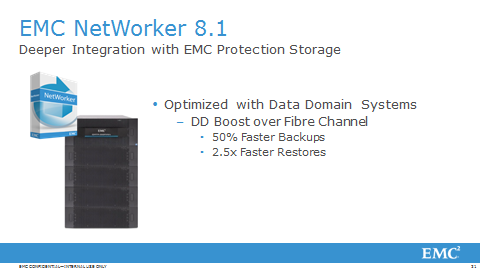Today EMC is announcing the new Networker 8 via a webcast, so I decided that I will be blogging about it as I watch it so I’ll be posting some highlights and new features as I go !
It is Networker’s 22nd Anniversary and for the announcement EMC has done a racing themed webcast that is set in a racing garage. EMC is comparing the new Networker 8 to a V8 engine.
Some of the Networker 8 Highlights:
Deeper Integration with EMC Data Domain
The NetWorker 8.0 client now utilizes Data Domain Boost, ensuring that all file and application types supported by NetWorker are delivered directly to the NetWorker client upon installation. This integration, unique to NetWorker, optimizes the infrastructure with integral support of deduplication backup at the data source.
Data Domain Boost now has support for Microsoft SQL Server 2012 for both VSS and VDI as well as Hyper-V, and file systems including VMware images. Support for Data Domain Boost allows users to take advantage of deduplication backup while reducing backup times by 50 percent or more and network traffic by 90 percent or more.
Enhanced Support for Microsoft Applications
Through the NetWorker Module for Microsoft Applications (NMM) 2.4, NetWorker 8.0 now makes Microsoft data protection even easier and more extensive with new application support for SQL Server 2012, including AlwaysOn Availability Groups. SQL Server AlwaysOn Availability Groups enable backup to any secondary server in the group, which ensures that backup processing does not impact the production server. Unique to NetWorker is the ability to back up to a secondary replica either synchronously or asynchronously.
The ability to perform instant file-level restores, known as Granular Level Recoveries (GLR), for Hyper-V and SharePoint and folder-level recovery of Exchange has also been added. SharePoint administrators may continue to use Kroll OnTrack for GLR. With NetWorker 8.0, the NetWorker file system can now also be used by administrators to mount the recovery databases of SharePoint, as well as that of the other NMM-covered applications, to a virtual drive letter on the administrator’s server. Hyper-V support has been enhanced with Federated Hyper-V Cluster Shared Volume backup, enabling more flexibility for backup and restore operations with live migrations of VMs to a different Hyper-V CSV node.
To further simplify license management and installation, the NetWorker Module for SQL Server has been merged with the NetWorker Module for Microsoft Applications 2.4. Now a single license for NetWorker Module for Microsoft Applications will also be able to manage SQL VDI-based backup and recovery (for transaction log support), which many enterprise customers still prefer over VSS-based backup.
Enhanced Enterprise Management
NetWorker manageability and ease of use have been improved with a number of new features. The addition of Synthetic Full Backup saves time and resources by enabling fewer full backups while reducing recovery steps. The new multi-tenancy feature enables hybrid cloud services with the ability to isolate tenant data and NetWorker resources when sharing a backup environment. The addition of wizards further uncomplicates backup configuration and day-to-day management for Microsoft SQL Server, SharePoint, and Exchange. Support of full LDAP v3 and Active Directory enhances security while simplifying configuration management.
Additional Product Details
In addition to the capabilities discussed above, NetWorker 8.0 provides a number of other new features:
• NDMP Checkpoint Restart for NetApp maintains the backup process through an interruption
• New role-based authorization enables a more granular, policy-driven process for granting permissions through default roles
• Enhancements to Windows disaster recovery with a single-pass backup of file system and system state data, save time and space
• New usability features built into the NetWorker Management Console simplify operations while increasing control
• Additional security enhancements for the enterprise include auditable security events and a new, more secure HTTP server and audit log
• New operating systems supported: Solaris 11 (server, node, client) Linux distributions: (Debian, Red Flag 6, Ubuntu, CentOS 6, Fedora)

Leave a Reply